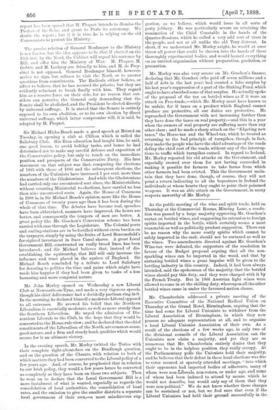Mr. Morley was also very severe on Mr. Goschen's finance,
declaring that Mr. Goschen (who paid off seven millions and a half of debt in the last year) had created a false surplus by his last year's suppression of a part of the Sinking Fund, which ought to have absorbed some of that surplus. He actually spoke of the proposal of the tax on bottled wines as if it were an attack on Free-trade,—which Mr. Morley must have known to be unfair, for if taxes on a product which England cannot produce are protective, all our duties are protective. He reproached the Government with not increasing further than they have done the taxes on real property,—and this in a year when the owners of real property are suffering more than any other class ; and he made a sharp attack on the "fidgeting new taxes," the Horse-tax and the Wheel-tax, which he treated as returning to the bad principle of turnpikes, though, in fact, they make the people who have the chief advantage of the roads defray the chief cost of the roads, without any of the interrup- tions to traffic which turnpikes caused. In regard to Ireland, Mr. Morley repeated his old attacks on the Government, and especially crowed over them for not having succeeded in making it possible for farmers to take farms from which other farmers had been evicted. This the Government main- tain that they have done, though, of course, they will not print a return indicating to all the boycotters in Ireland the individuals at whose hearts they ought to point their poisoned weapons. It was an able attack on the Government, in many respects unworthy of Mr. Morley.


































 Previous page
Previous page